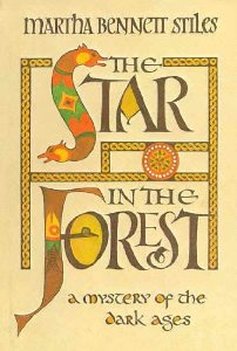 I'm hoping to have many, many authors come visit my blog to tell an experience they've had with editing or revision and share some before and after examples of their work. I'm thrilled that my first guest is a woman I greatly respect, veteran children's author, Martha Bennett Stiles. Martha: In 1978, I sent the manuscript of The Star in the Forest, over which I had labored off and on, for 10 years, to Judith Whipple, then at Four Winds Press. (She had published my first picture book, Dougal Looks for Birds). She returned the manuscript, saying, "Cut it in half and I'll take it. Good ol' Judy can't mean anything so draconian, I told myself, cut 33%, and dispatched it. She sent that MS back by return mail. "I said half," was all she wrote. You can bet I never trifled with her again, and we were happy together until she retired. At least, I was happy. For all I knew, she detested me and was patient for business reasons only. I hope not, because I did like her a lot. What she had found most objectionable about The Star in the Forest’s manuscript was that I described 3 battles and one would have sufficed; I gave the background stories on minor characters when there were quite enough major characters, thank you, to make a book close to too expensive to produce profitably. I described my hero Alarik’s forest journey within an inch of its life and the reader’s. And so on. So I’m grateful to Judy Whipple for making me expunge lots. Even cut as described, the book numbers 206 pages and weighs 9.6 ounces (“You could look it up.”). Of my 12 books, The Star in the Forest is one of my four favorites. School Library Journal gave it a starred review, and Jane Yolen gave it superlatives in her Guide to Writing for Children; I keep both in my prayers. Out of print, the book is offered by AbeBooks for prices ranging from $3.46 to $80.76; by Amazon, from $233 to a penny. An example of what I cut: not exciting and doesn’t advance the plot. The best morels grew under the birch trees along the brook that started somewhere deep in the forest and flowed, always imperceptibly broadening, through the meadows where the lyre-horned cattle grazed, between fields of rustling oat beards and bright wheat, into the river that turned Poijou’s mill. Valrada had gathered mushrooms along this brook all her life. Before she had been old enough to be trusted to know good from poisonous, she had known that when the little pink oak leaves stretched themselves squirrel-ear size, it was time for the harvest that appeared without sowing or tilling. She had soon learned that if she put a basket on her arm, she could toss embroidery hoops aside and wander all afternoon without being frowned at or sighed over, so long as she never brought the basket back absolutely empty. Once Valrada realized she was pretty, she had ceased to long to be a boy, but her strong preference for woods and stable over kitchen and weaving room remained. When the high hedge of beech and thorn that lined her path hid her from the Hall, Valrada took a deep breath, stretched out her basketed arms, and smiled.” Here are 3 paragraphs which made it to the printer: Alarik’s hand tightened on his spear and his lips began to move. Angels that run between the stars, give strength to my horse in this battle, that he shall not be tired and he shall not stumble and no weapon shall touch him and– A roar from the walls and the gates of Poitiers swung open. Rebel cavalry poured out onto the broad causeway, shrieking to God and St. Hilary, and charged the stunned Burgundian foot. Alarik’s lips stopped moving. Snow from Storm’s hoofs splattered Alarik to the waist; the wind whistled past. A neck behind, Lord Eurik was yelling like a madman. He saw Alarik look back and waved his shield. Lord Dag was still between him and Rikimer. The horses swept on with a noise like the surf, flanking the Burgundians. The rebels wheeled and charged to meet them. An arrow whined past Alarik’s shoulder. He ducked his head down further behind his shield and chose his man. The rebel carried his shield low, but Alarik never liked aiming for a face. The head could dodge too easily. Alarik’s spear took the rebel on the shoulder and lifted him out of his saddle. Storm bucked and Alarik freed his spear. He wanted to finish the rebel but a bay was bearing down on him. Storm faced the bay. Its rider’s teeth were bared, his helmet crest stiff like the ruff of a snarling dog. Then his shield hid him. Alark flung his spear underhand and took the bay in the chest. The poor beast crashed on its head: The rider was thrown under Lord Dag’s hoofs. Alarik drew his sword and in the moment he had to breathe, looked back for Lord Eurik. He saw the arrow hit Lord Eurik in the face.” Learn more about Martha Bennett Stiles and her books: www.marthabennettstiles.com http://mbstiles.spaces.live.com Sailing to Freedom 2012 Lonesome Road 1998 One Among the Indians 1962, 2006 So, I've finished going through my new novel and marking all the mistakes and things I want to change. What I discovered above all is that I like to use the word "actually". I use it mostly when people are talking in my book, which makes a little sense. I say "actually" a lot when I talk, and I'm trying to make my teenagers sound realistic. However, it's a little ridiculous after a while. I went through the book and deleted almost all of them.
When my editor helped me through Cry of the Sea, the words she kept circling for me were "just" and "really" and made me get rid of them. I found that I still had those words a lot in this new ms as well Once again I cut them. I'm not sure why I like using qualifiers, but now that I'm aware of them, I see how often they are used in books with little editing (ie: self-published) verses ones that have been edited well. They stand out as if they are in bold print to me now. I recommend that upon finished a draft, use your Find button and put in words like "just", "really", "actually", "seriously" and "very". See how many times they are showing up in your text. Delete them and see if your sentences still work. I can't say that I won't continue to put these useless words in my early drafts in the future. Habits are hard to break. I do hope to never submit a draft to an editor or agent with a manuscript filled with them, though. What are your most commonly use pointless words? |
D. G. DriverAward-winning author of books for teen and tween readers. Learn more about her and her writing at www.dgdriver.com Archives
July 2024
Categories
All
|
Author D. G. Driver's
Write and Rewrite Blog
“There are no bad stories, just ones that haven’t found their right words yet.”
A blog mostly about the process of revision with occasional guest posts, book reviews, and posts related to my books.

 RSS Feed
RSS Feed